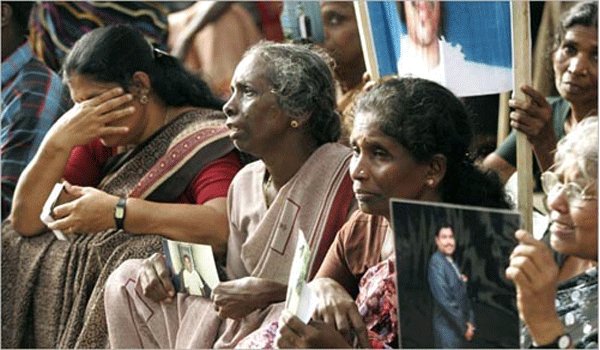The three-member Commission comprising Maxwell Paranagama as Chairman, Suranjana Vidyaratne and Mano Ramanathan makes its observations following its conduct of 11 public sittings in Kilinochchi, Jaffna, Mullaitivu, Batticaloa, Mannar, Trincomalee, Vavuniya and Ampara, and discussions with various stakeholder groups.
By April 9, 2015, the Commission had received 16,153 complaints from residents in the Northern and Eastern Provinces and 5,200 complaints from the families of Security Forces personnel.
The Commission notes that allegations of forced disappearances, abductions and arbitrary arrests have been made against the Liberation Tigers of Tamil Eelam (LTTE), Security Forces, Armed Groups and Unknown Groups. Based on the inquiries conducted thus far, accountability and responsibility by these parties vary from District to District, and in the Northern Province, 60 percent of the allegations were levelled against the LTTE, 30 percent against the Security Forces, five percent against Armed Groups and five percent against Unknown Groups.
In its Interim Report, the Commission has specified by way of charts and graphs the nature of complaints received in terms of ethnicity, age and gender of the missing person, year and District, and the allegedly responsible party.
The Report also contains allegations by parents of missing persons that their children continue to be kept in prisons, refugee camps, and detention centers without any information made available to their families.
The Commission has also reported cases of forced disappearances and abductions alleged to have been committed by officers of the Security Forces, according to oral submissions made by relatives of missing persons, which require to be referred to the Attorney General for judicial action. Grave incidents requiring in-depth investigation have also been reported based on oral submissions made at public sittings.
These include the Sathurukondan and Eastern University massacres of 1990; massacre of 600 Policemen in 1990 in Ampara; and massacre of Muslim civilians in Kurukalmadam.
The Commission has recommended that these allegations be further investigated by a special investigating team to gather credible evidence against person/s responsible to institute criminal proceedings according to domestic laws.
The Commission's procedure for inquiry also entailed an examination of medical registers from relevant hospitals that treated patients during the conflict and its aftermath in order to ascertain information and track the whereabouts of missing persons. The Commission, through the Ministry of Foreign Affairs, had also requested information on names of persons who may have sought refuge in foreign countries, but such information had not been disclosed by foreign Governments citing privacy laws.
The Commission had made written requests to the Defense Ministry and Justice Ministry to release to the Commission names of persons who were in custody of prisons, detention camps, refugee camps, and rehabilitation centers. While noting with regret that such requests had not been complied with, the Commission decided to notice the respective officers to appear before the Commission in terms of the powers vested in the Commission by the Special Presidential Commission of Inquiry Act.
Where possible, the Commission has acted promptly to provide assistance to families of missing persons during public sittings with the assistance of Government Agents and Divisional Secretaries in aspects such as issuance of Death Certificates, payment of compensation in terms of Government Circular No. 06/1722/260/020 of 2006, rectifying delays in payment of compensation and pensions to injured persons, intervening on behalf of persons on employment matters and land issues, and identifying persons who have been deprived of livelihood assistance through the Samurdhi and Divineguma projects.
The Commission notes that problems of housing livelihood and other assistance have been provided by the Government, Non-Governmental Organizations (NGOs), International Non-Governmental Organizations (INGOs), International Committee of the Red Cross (ICRC), United States of America (USA), European Countries, Australia, India, Korea, Pakistan and Japan. However the Commission notes that the livelihood assistance provided is far from adequate for the purpose of rebuilding their lives.
Based on observations of the behavioral patterns of the complainants at public sittings, the Commission recommends to implement a well formulated programme to provide counseling by experienced counselors, and psycho-social support and related services for the benefit of the families of missing persons. In this respect, the Commission, in collaboration with the ICRC, relevant Government agencies engaged in counseling, and other parties, has drawn up a comprehensive programme for counseling in the North and East.
On July 15, 2014, the scope of the Commission's mandate was extended to inquire into and report on matters that have been referred to in paragraph 4.359 of the Lessons Learnt and Reconciliation Commission (LLRC) Report, which dealt in large part with the facts and circumstances relating to the internal armed conflict that ended on May 19, 2009, and in particular with the possible violation of International Humanitarian Law and International Human Rights Law. An expert panel of eminent persons headed by The Right Honorable Sir Desmond De Silva, QC (Chairman) was appointed to assist the Commission in the capacity of an Advisory Council. A Report in respect of matters set out in the extended mandate is being drafted in consultation with the Advisory Council and would be submitted as a separate Report.
While executing its mandate, the Commission had held extensive discussions with the ICRC, United Nations (UN) agencies including the United Nations Human Rights Council (UNHRC), diplomatic representatives from the United States, the United Kingdom, Japan, Australia and India, UN Special Rappoteur Pablo Degreef, and Sri Lankan media organizations. During these discussions, the Commission had regularly conveyed information on the steps taken to implement its mandate in a transparent and independent manner.






